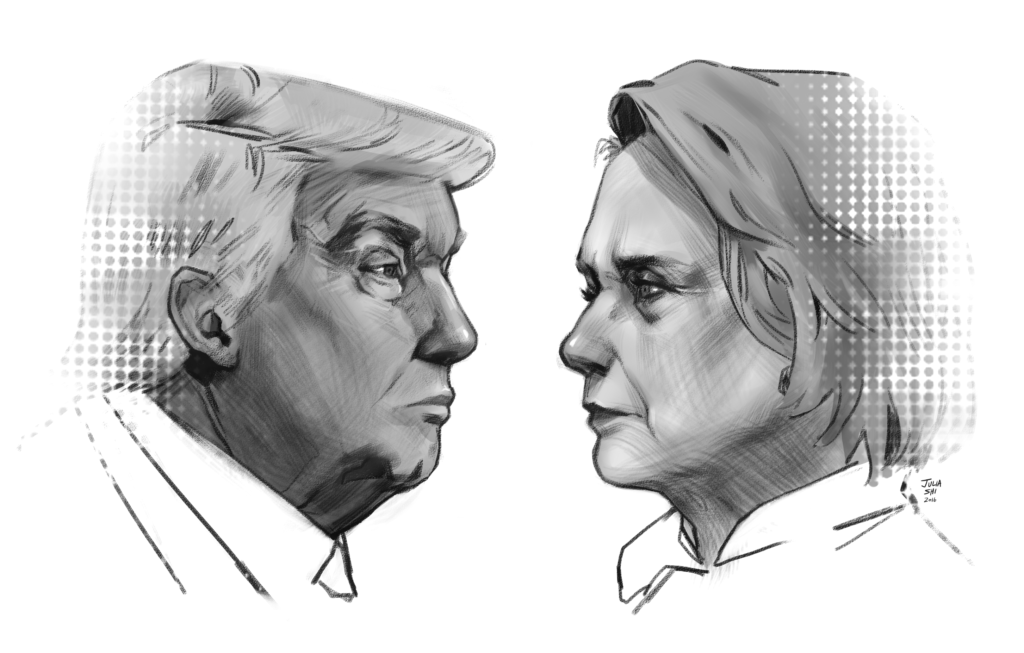I doubt I will vote for Donald J. Trump in November. But let me explain why I might.
A few weeks ago, the Claremont Review of Books, that last refuge of West Coast Straussianism, published a much-maligned essay entitled “The Flight 93 Election” referring to the doomed fourth flight on 9/11 that crashed in a field in Pennsylvania. The author remained anonymous, identifying himself only as Publius Decius Mus, a consul of the early Roman republic who sacrificed himself in a battle under Mount Vesuvius.
The essay’s central point was a simple one: if Hillary Clinton LAW ’73 wins, the republic our founders created disappears into the recesses of history. If Trump wins, that’ll probably happen anyway. To quote the modern Publius: “2016 is the Flight 93 election: charge the cockpit or you die. You may die anyway. You — or the leader of your party — may make it into the cockpit and not know how to fly or land the plane. There are no guarantees.” Or, in essence, the republic is dead.

“The Flight 93 Election” is among the most tasteless comparisons ever made, but not among the most inaccurate. American democracy is indeed on its deathbed — or, rather, hurtling toward its own destruction, piloted by men and women who have no qualms with guiding it to a fiery end so long as they’re the ones grasping the wheel.
Blame for this unfortunate predicament falls all around: point to eight years of governing by executive order, to the slow usurpation of legislative control by our unelected bureaucracy, to the failure of the Republican Party to show any interest in the messy work of governing. The divine justices of our Supreme Court have gone to and fro dismantling the democratic order, abusing their power of judicial fiat to terminate organic processes of democratic decision-making at the state and federal levels. Our Senate is composed of men and women who view the seats of Webster and Clay as mere springboards to the presidency. Politicians stand for power and intrigue, not principle, and the revolving door spins ever onward. Whereas once American democracy had room to grow and thrive, now it only recedes.
None of this will change when Clinton is elected. Rather, her administration will simply build on the precedent her predecessor has left and eventually bypass the legislative process entirely. The only vox populi that will matter is that of the Democratic coalition, and even that speaks only once every four years. The Republicans will likely retain the House, and maybe the Senate, but that’s no matter: just rule without them.
And I suspect, too, very little will change if Trump is elected. The bureaucracy has its own inertia, and the wise justices of the Supreme Court would rein in his more fascistic urges. But something might change. Maybe. That’s the beauty of the Flight 93 metaphor: Sure, you’ll probably crash into the empty fields of central Pennsylvania, but that would’ve happened anyway. You might as well storm the cockpit — what do you have to lose? At least he’ll piss off the right people.
But this is not, sadly, a reason to vote for Trump. You can’t predicate choosing the leader of the free world on whether he’ll infuriate the right constituencies, gleeful as it might make you (or me). Nor is control over the Nine a real pro-Trump case; one can easily conjure up the image of Mitch McConnell, having heard of the launch of the nuclear missiles over some arcane Twitter slight, feverishly whispering: “At least we had the Court!” Our politicians have revealed their sycophantic natures, willing to bend to The Nominee’s orders whenever he wills it. They would hesitate to intervene even if the fate of the world depended on it. Trump simply cannot be trusted with the nuclear codes.
This does not mean, though, that you must give your positive assent to Hillary Clinton, who will run as roughshod over American democracy as her predecessor has, and who will assign it its final grave somewhere in the sludgy tidewaters of the Potomac.
I advise, then, that you sit this one out. Don’t vote in the presidential race. I find neither a democratic imperative nor a civic obligation to take part in this final junking of the Constitution, of American democracy, of the republic our Founders dreamed into being in the heady summer of 1787. Not to vote is not a vote for Trump; it is an act of filing conscientious objection to this orgy of destruction. Let the collapse run its course; let the people realize what they have lost. Only then, we may begin to rebuild.
Noah Daponte-Smith is a junior in Berkeley College and formerly covered City Hall and Politics for the News. Contact him at noah.daponte-smith@yale.edu .
Illustration by Julia Shi.







